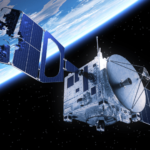
Orbit Fab, a firm that provides “gas stations in space,” will refill Astroscale’s LEXI, or Life Extension In-Orbit, geostationary satellite servicing vehicle.
Orbit Fab has agreed to supply up to 1,000 kg of Xenon propellant to refuel Astroscale’s LEXI spacecraft, the first of which is scheduled to launch in 2026.
The arrangement is crucial, according to Ron Lopez, president and managing director of Astroscale U.S., because the ability to refuel in orbit will allow LEXI vehicles to serve more clients for longer periods of time without running out of fuel.
In a video chat with reporters on Jan. 11, Lopez said that the ability to extend the life of satellites using vehicles like LEXI and the capacity to refuel such maintenance vehicles “make orbital activities more viable.”
Astroscale, based in Japan with a subsidiary in the United States, joined the satellite service industry in 2020 after purchasing Effective Space Solutions, an Israeli satellite life-extension and servicing company that developed the Space Drone vehicle.

According to Lopez, the company developed LEXI using ESS intellectual property and is now adding more advanced features such as four robotic arms. Astroscale’s factory in Israel is developing the sensors, and the vehicle will be constructed in the United States.
Station keeping and attitude control, momentum management, inclination correction, geostationary orbit migration, and retirement to graveyard orbit are among the capabilities LEXI will deliver, according to Lopez.
The cooperation with Astroscale, according to Orbit Fab CEO Daniel Faber, is a blueprint for how in-space servicing firms may collaborate to expand the space economy. “We can monetize a portion of our contracts before we deliver to our customers,” he explained, “enabling us to quickly expand our network of tankers and shuttles.”
Orbit Fab, a firm launched in 2018, created the RAFTI (Rapidly Attachable Fluid Transfer Interface) refuelling port. Government and private operators can use the port to make their satellites compatible with Orbit Fab’s refuelling tankers.
Last year, the business launched its first propellant-storage tanker into low Earth orbit, and it expects to launch its second tanker into geostationary orbit on a SpaceX Falcon 9 lunar lander mission in late 2022 or early 2023. Orbit Fab’s first two LEO fuel shuttles are scheduled to launch in 2023.

“Our architecture involves tankers that contain a lot of fuel and fuel shuttles to transfer fuel between the tankers and operational spacecraft,” said Faber.
Customers for LEXI have yet to be announced by Astroscale. Lopez declined to disclose any potential clients, but said the company is interested in working with both commercial and government clients.
In the next five to ten years, Orbit Fab plans to launch hundreds of fuel tankers and shuttles into low Earth orbit and geostationary orbit. According to Lopez and Faber, the companies are looking into new ways to extend the on-orbit servicing sector, such as transferring fuel directly from tankers to operational satellites.




